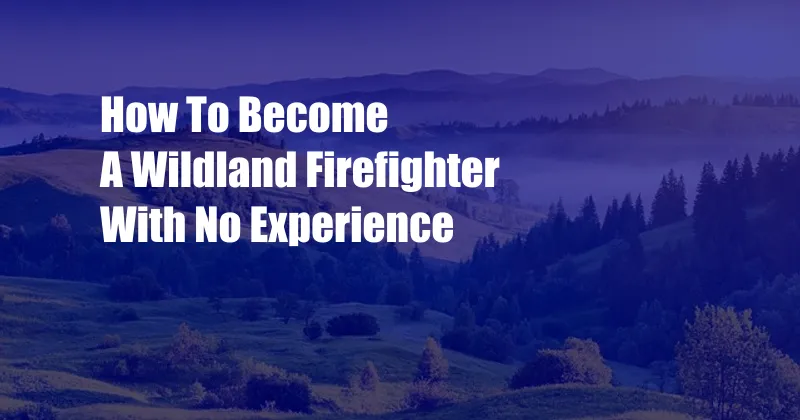
**Becoming a Wildland Firefighter: A Path for the Uninitiated**
Journey of Resilience and Adrenaline
The crackling of flames against the dry underbrush, the adrenaline pumping through your veins as you navigate treacherous terrain – the life of a wildland firefighter is anything but ordinary. For those without prior experience, the path to becoming one of these courageous heroes may seem daunting, but it is a journey filled with purpose and personal growth.
Unleashing the Untapped Potential
Becoming a wildland firefighter with no experience requires a unique blend of physical fitness, mental fortitude, and a deep respect for the power of nature. It begins with training programs offered by federal agencies like the U.S. Forest Service and the National Park Service. These programs provide comprehensive instruction on topics such as fire behavior, wildland fire suppression techniques, and safety protocols.
Embracing Challenges and Forging a Path
While prior experience can certainly be an advantage, it is not a prerequisite for pursuing a career as a wildland firefighter. With determination, a strong work ethic, and a willingness to embrace challenges, anyone can navigate the path to this rewarding profession. The journey may involve long hours, intense training, and time away from loved ones, but the rewards of serving and protecting communities far outweigh the sacrifices.
Taming the Flames: A Historical Perspective
Fire has been a force of nature for millennia, shaping both the environment and human civilizations. Wildfires, while often destructive, play a crucial role in maintaining the health and diversity of ecosystems. Wildland firefighters have existed for centuries, from Native American tribes who used controlled burns to Europeans who fought against devastating wildfires.
In the 20th century, the role of wildland firefighting became more organized, with the establishment of federal agencies dedicated to fire suppression and prevention. Today, wildland firefighters are highly trained specialists who work tirelessly to protect our communities, natural resources, and the lives and livelihoods of countless people.
The Art and Science of Wildland Firefighting
Wildland firefighting is a complex and demanding profession that requires a multifaceted approach. Firefighters must possess a deep understanding of fire behavior, including how it spreads, how it can be controlled, and how to predict its movements. They must also be familiar with the different types of wildland fuels, such as grasses, brush, and timber, and how they contribute to fire intensity.
In addition to fire behavior, wildland firefighters must be proficient in a variety of suppression techniques, including hand tools, water hoses, and aerial firefighting. They must also be able to work effectively as part of a team, coordinating their actions to suppress fires quickly and efficiently.
Harnessing Innovation: The Latest Trends in Wildland Firefighting
The field of wildland firefighting is constantly evolving, with new technologies and strategies emerging to enhance the safety and effectiveness of firefighters. One recent trend is the use of drones to gather real-time data on fire behavior and to deliver supplies to remote areas. Other advancements include the use of predictive modeling to anticipate fire spread and the development of new fire-resistant materials for protective gear.
Tips and Expert Advice for Aspiring Wildland Firefighters
If you are considering a career in wildland firefighting, there are a few key tips to keep in mind.
- Embrace physical fitness: Wildland firefighting is a physically demanding job that requires endurance, strength, and agility. Start by developing a regular exercise routine that includes cardiovascular exercises, strength training, and flexibility exercises.
- Gain experience in the outdoors: Spend time hiking, backpacking, and camping in different environments to familiarize yourself with the terrain and develop a sense of situational awareness.
- Volunteer with fire departments or emergency response organizations: This will provide you with hands-on experience in firefighting and emergency response, which will be invaluable when applying for wildland firefighting jobs.
- Pursue education and training: Consider taking courses in fire science, forestry, or natural resources management. You may also want to obtain certifications, such as the Wildland Firefighter Type 1 certification, to enhance your qualifications.
Frequently Asked Questions About Wildland Firefighting
Q: What are the physical requirements for becoming a wildland firefighter?
A: Wildland firefighters must be in excellent physical condition, able to perform strenuous activities for extended periods. They must also be able to pass a physical agility test, which may include tasks such as running, jumping, and carrying heavy objects.
Q: How much do wildland firefighters make?
A: The salary of a wildland firefighter varies depending on experience, location, and agency. According to the U.S. Bureau of Labor Statistics, the median annual wage for wildland firefighters was $50,680 in May 2022.
Q: What are the risks of being a wildland firefighter?
A: Wildland firefighting is a dangerous job that comes with inherent risks. Firefighters may be exposed to extreme heat, smoke, and flames, as well as falling trees, rolling rocks, and other hazards. They may also work long hours in remote locations, away from family and friends.
**Conclusion**
Becoming a wildland firefighter with no experience is a challenging yet rewarding path to pursue. With determination, physical fitness, mental toughness, and a deep respect for nature, anyone can embark on this journey of serving and protecting our communities and natural resources. The rewards of being a wildland firefighter are immeasurable – the feeling of accomplishment, the camaraderie, and the knowledge that you are making a real difference in the world.
Are you ready to embrace the challenges and embark on this extraordinary adventure?